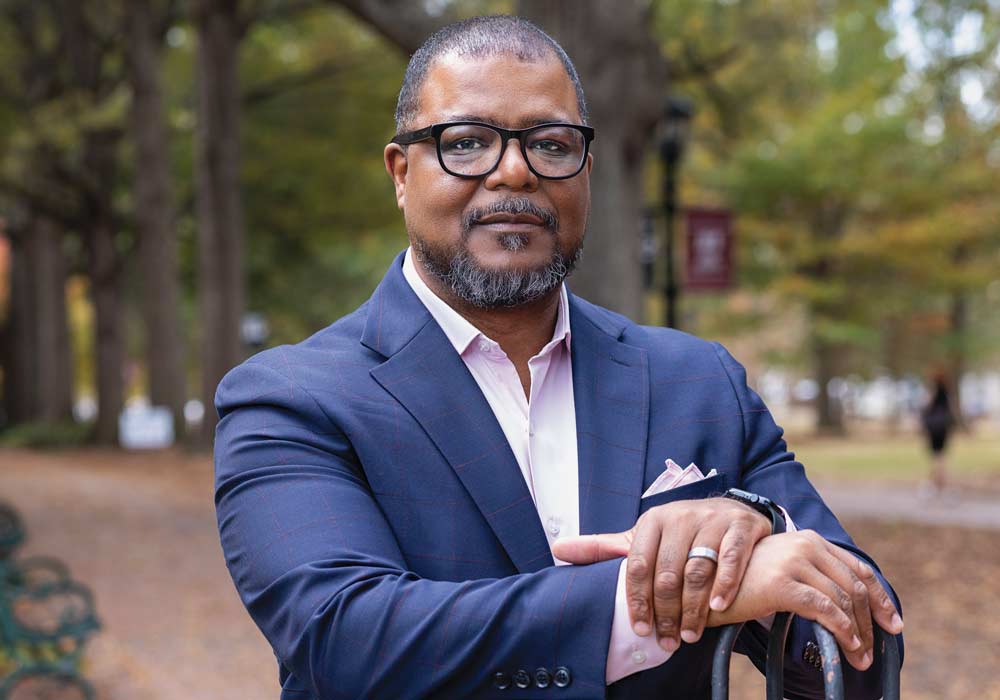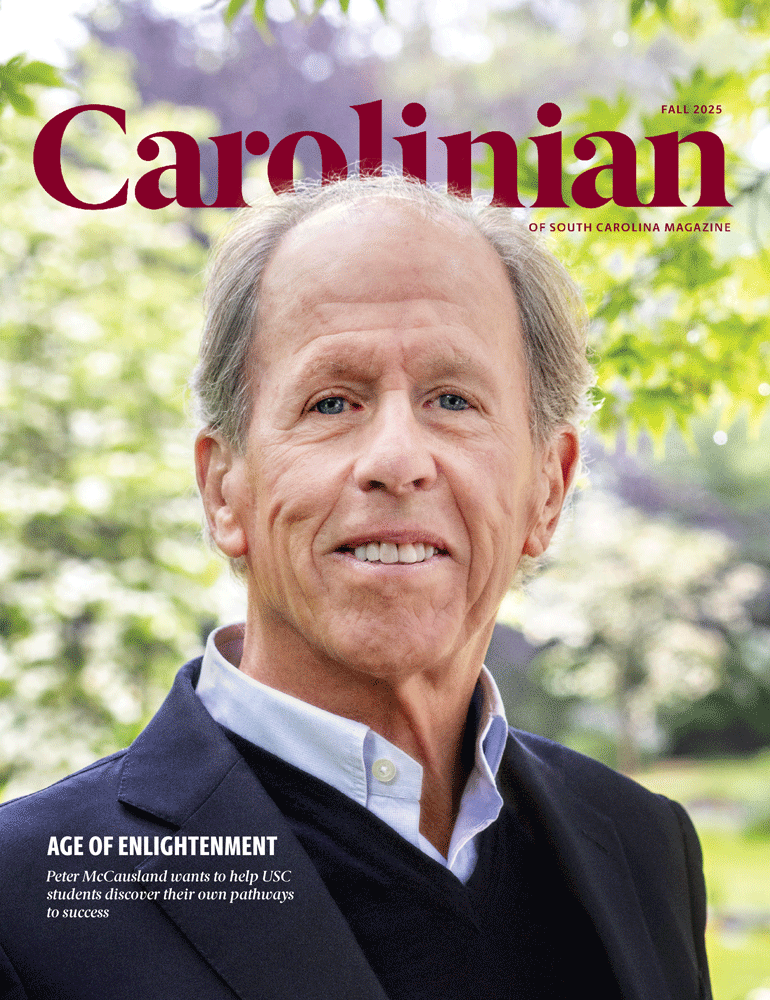In March 2023, University of South Carolina alumnus Leroy Chapman Jr. made headlines — as the first person of color to be named editor-in-chief of the Atlanta Journal-Constitution.
It was a big deal for the 155-year-old paper, for the city of Atlanta and for journalism in general. It was also a big deal for Chapman’s alma mater, which recognized his professional achievements with the 2023 College of Arts and Sciences Dean’s Award.
The former English major turned big city editor made the most of his November visit, talking to a journalism class in the morning and an English class in the afternoon. In between, he enjoyed lunch with USC’s student chapter of the National Association of Black Journalists at the School of Journalism and Mass Communications.
“What Carolina provided me was a challenge but also the assurance that I could do hard things and that maybe there are things that are available to me,” he said. “And being an English major helped make me a deeper thinker and a more competent debater.”
But fielding questions from today’s student journalists was about more than reflecting on his college days and offering career advice. It was also an opportunity for Chapman to discuss how the paper he now serves as editor-in-chief is evolving to meet the needs of one of the South’s largest, most culturally vibrant metropolitan areas.
Chapman is not new to Georgia’s capital city or to its flagship paper — he joined the AJC as a story editor in 2011 and worked his way up the ranks — and his list of editorial priorities reflects a studied awareness of the issues Atlanta faces. Since taking over as editor-in-chief, he has also solicited plenty of input from colleagues and the community.
Being an English major helped make me a deeper thinker and a more competent debater.
“I’ve had the ‘welcome to the job’ tour,” he said. “And I’ve had lots of feedback: ‘Here’s where the AJC can help,’ ‘Here’s where the AJC needs to show up,’ ‘Here’s why the AJC is still central.’”
His short list of areas where he sees the paper taking that central role includes K-12 education, issues relating to affordable housing and social mobility. He also recognizes Georgia’s potential to shape the national conversation and the paper’s responsibility to provide fair, honest, in-depth political coverage.
“We are now getting close to a very consequential election, so as editor I have to think about that,” he explained. “That’s not only thinking about Atlanta and Georgia but thinking about America because Georgia will be decisive. Trumpism is going to have a reckoning in Atlanta. It’s either going to be at the ballot box or it’s going to be in a courtroom.”
And then, of course, there’s the paper’s role in chronicling Atlanta’s cultural impact — locally, nationally and even internationally. To illustrate, he invites the students to stick around after the NABJ lunch and watch a clip from a brand-new documentary produced by the AJC, The South Got Something to Say.
The 90-minute film, which premiered at a Midtown Atlanta theater in November and is now streaming on the AJC website, recognizes the 50th anniversary of hip hop. Featuring a “who’s who” of Atlanta-based hip hop artists, it positions the Georgia capital as the epicenter of contemporary Black culture in America.
It also signals the start of a new era at the AJC as the legacy news brand diversifies its content and content delivery. In addition to documentaries like The South Got Something to Say, the AJC under Chapman is expanding its footprint through podcasts and a new broadcast channel, AJC Live.
“We’re able to cover the news in multiple ways,” Chapman explains. “Podcasts and radio shows are an extension of our journalism. Not only do we tell you the news, but we’re able to talk about it in a way that shows our authority in certain areas. Politics is one where we have great authority. Doing things like this film, that’s also an extension of our journalism.”
It’s a different landscape than the one he entered as a stringer for The State newspaper while he was an undergraduate English major at USC, but his formative years as a journalist in Columbia are never far from his mind.
To help students understand the power of journalism, he cites one of his very first assignments as a reporter. The story, which ran in The State’s Neighbors section, was about a Columbia hairdresser who used her spare time to style hair for young girls, most of them Black, who were in protective custody.
After it was published, members of the community reached out to the woman, wanting to pitch in. And they called Chapman, thanking him for writing the story. His role was a small one compared to what the hairdresser was doing — that wasn’t lost on him — but it was still a role; it made a difference.
Though he had been offered a job by the Office of the South Carolina Secretary of State, where he had previously interned, seeing his article in a frame on the hairdresser’s wall helped him realize what he wanted to do for a career.
He has made a few stops since — reporter at The Sumter Item, associate editorial page editor at his hometown Greenville News, government and politics editor at The State — but the basic mission hasn’t changed.
“I can’t tell you what it felt like to not only see that story in print, but also to see the response,” he said. “It felt like I was making a difference. The way I’m wired, I want to do meaningful work. That’s it.”

